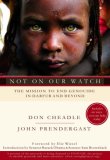Summary | Excerpt | Reviews | Beyond the Book | Readalikes | Genres & Themes | Author Bio

 Book Reviewed by:
Book Reviewed by:
BookBrowse Review Team
Buy This Book
How do we respond to these horrors?
What we’ve learned is that there are three pillars to fostering a real change in human rights and conflict resolution policy: field research to learn what is really happening in the conflict zones and what needs to be done, high-level advocacy to deliver the message to the people who determine policy, and domestic political pressure from a constituency that cares about these issues and takes them up with their elected officials.
This last one often goes missing. Sustained and robust campaigns by organized citizens are needed for maximum impact. Fostering these constituencies must be our focus.
Will the United States lead efforts to protect people when they are being systematically annihilated by predatory governments or militias? Will we punish the perpetrators of crimes against humanity? Will we promote peace processes with high-level envoys and other support? None of these options is beyond the realm of the possible; they are simply matters of political will. If U.S. citizens and therefore the government answer yes to these questions, millions of lives will be spared in the coming years.
The good news is that much of the suffering could come to an end. It is within our power. If the U.S. government takes a lead role during each crisis marked by crimes against humanity, our chances to prevent or end these crimes increases dramatically. If the U.S. government had taken a leading role in three areas of policy—peacemaking, protection, and punishment—these crimes could have been prevented or stopped. If U.S. citizens and their government increase their activism and work to build an international coalition to stop mass atrocities, major changes are possible.
Despite what you may see on the evening news, there are encouraging signs of progress. Indeed, sparse and sporadic news coverage of Africa focusing solely on crises there has led to a “conflict fatigue” associated with the continent as a whole.* By ignoring the positive news, U.S. and European media risk fostering a dangerous tendency to dismiss the entire continent as hopeless. So when wars erupt and their attendant human rights abuses emerge, the response—if there even is one—is often tentative and muted, and conflict-ridden countries easily descend into a free-fall. We think these conflicts are not just an affront to humanity; they are the greatest threat to overall progress throughout the African continent.
Yet despite the many obstacles, there is good news coming out of Africa every day. There has been a move away from dictatorships toward democracy in many countries, and a commitment on the part of many African governments to fiscally responsible economic policies focused on alleviating poverty. Peace agreements have been forged in countries which only a few years earlier had been ripped apart by war and crimes against humanity. Witness the tragic tales of Liberia, Sierra Leone, Angola, Mozambique, southern Sudan, Rwanda, and Burundi, all of which had horrific civil wars that came to an end, laying the groundwork for huge positive changes.
So that is the point. If we can prevent and resolve these wars that lead to such devastation, one of the biggest reasons for Africa’s misery and dependence will be removed. By giving peace a chance, we give millions and millions of Africans a chance.
We have identified the Three Ps of ending genocide and other crimes against humanity: Protect the People, Punish the Perpetrators, and Promote the Peace. (We will describe these in detail in Chapter 9.) If the government of the world’s sole superpower, the United States, motivated by the will of its citizens, takes the lead globally in doing these three things, crimes against humanity can come to an end.
The decisions we need to make to protect those who are suffering are clear, and the sooner we decide, the more lives will be saved.
Excerpted from NOT ON OUR WATCH by Don Cheadle and John Prendergast. Copyright 2007 Don Cheadle and John Prendergast. All rights reserved. Published by Hyperion. Available wherever books are sold.





The Funeral Cryer by Wenyan Lu
Debut novelist Wenyan Lu brings us this witty yet profound story about one woman's midlife reawakening in contemporary rural China.
Your guide toexceptional books
BookBrowse seeks out and recommends the best in contemporary fiction and nonfiction—books that not only engage and entertain but also deepen our understanding of ourselves and the world around us.